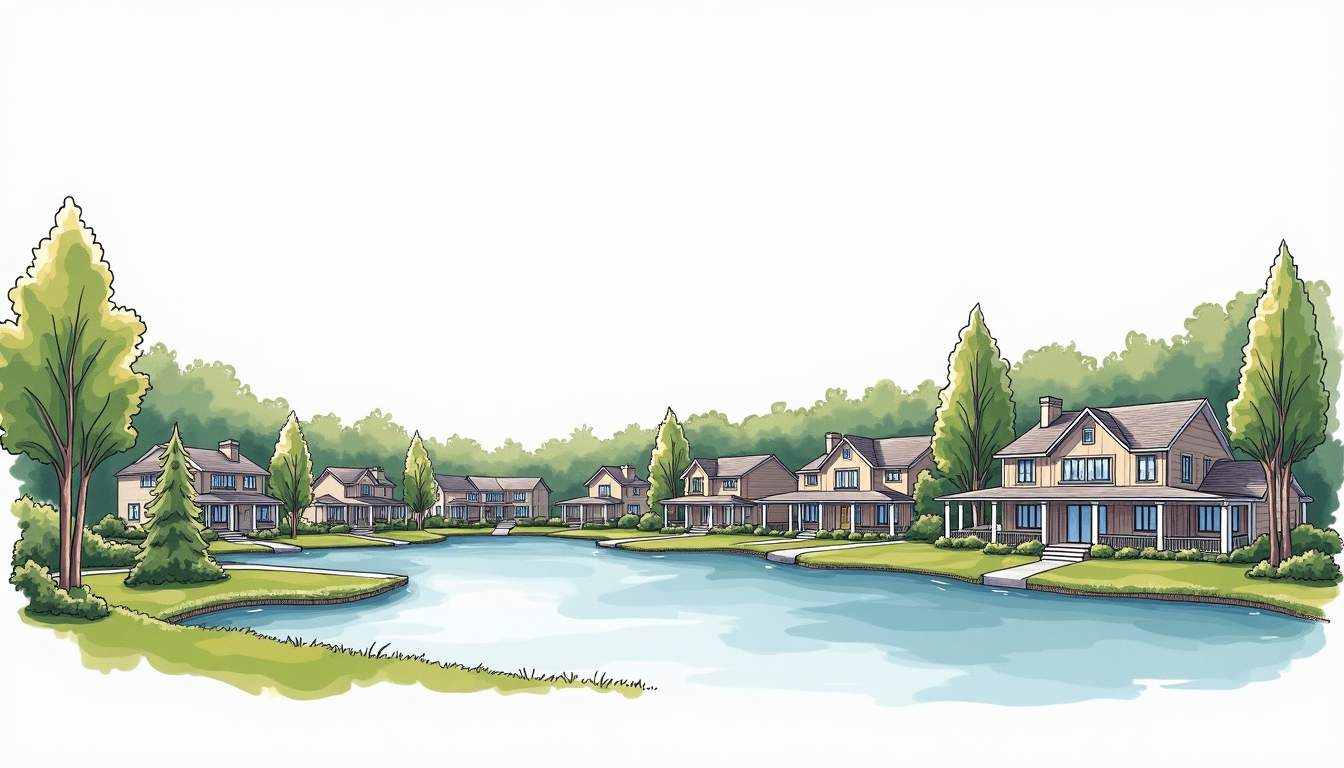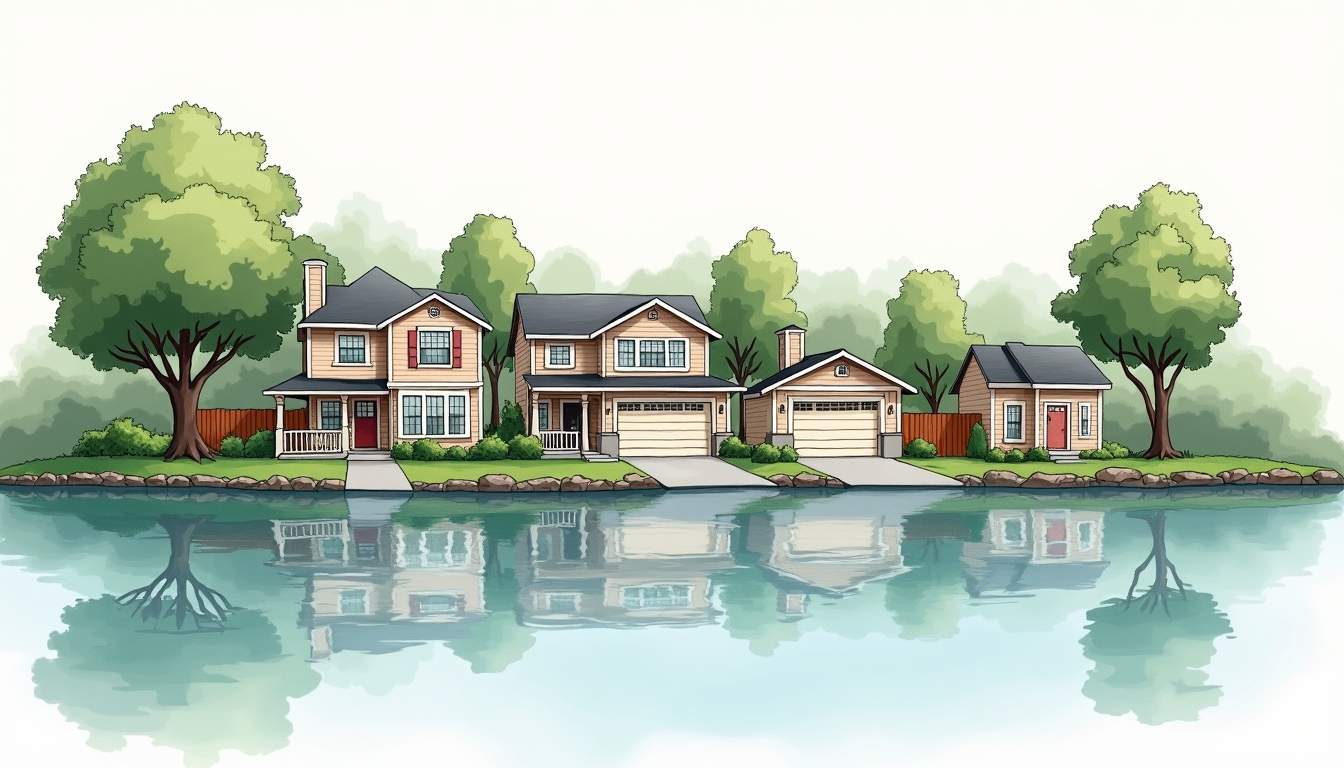
Finding the right home involves more than the number of bedrooms and the size of the yard. Quiet Lake Community offers a unique mix of lakeside living, well-maintained common areas, and a pace of life that appeals to families, retirees, and professionals seeking a retreat from urban bustle. This buyer’s guide walks through what to expect, how to prepare, and how to make a confident purchase in this particular neighborhood.
Quiet Lake Community is defined by its calm atmosphere and scenic water features. Mature trees line winding streets, and many homes have views of the lake or direct access to walking trails. The community tends to attract people who value outdoor recreation, tranquility, and neighborly interaction. A number of properties include docks, private piers, or shared lakeside amenities, which shape daily life and influence property values.
The architectural style is varied — from cottage-like bungalows to modern lakefront builds. Many homes were constructed in the late 1990s through the 2010s, so buyers will encounter both updated finishes and opportunities for renovation. Homeowners’ association (HOA) rules are in place for common area maintenance, landscaping standards, and sometimes exterior modifications; these regulations preserve the neighborhood’s character but can restrict certain personalizations.
Community events are a regular feature in Quiet Lake Community, fostering a strong sense of camaraderie among residents. Seasonal activities such as summer picnics by the lake, holiday boat parades, and weekly morning yoga sessions on the waterfront encourage both families and individuals to engage with their neighbors. In addition, local interest groups focused on bird-watching, gardening, and fishing provide varied ways for people to connect over shared passions.
Besides the natural beauty and recreational opportunities, Quiet Lake Community benefits from nearby conveniences that enhance its appeal. Residents have easy access to boutique shops, cafes, and farmers’ markets within a short drive. Well-maintained bike paths and public transportation options further support a balanced lifestyle that blends peaceful living with connectivity to larger urban centers. This combination of calm residential charm and practical amenities makes the neighborhood particularly attractive to professionals, retirees, and young families alike.
Recently, property values in Quiet Lake Community have shown steady appreciation, helped by limited inventory and consistent demand for lakeside living. Single-family homes are the most common listings, with prices varying considerably between interior lots and premier lakefront parcels. Condominiums and townhomes appear less frequently but can be a more affordable entry point for first-time buyers or downsizers. Seasonal demand can also affect pricing — listings that hit the market in late spring and summer often see faster sales activity.
Interest rates and broader regional trends influence local affordability. When mortgage rates are low and employment remains strong in surrounding job centers, competition rises, sometimes leading to multiple-offer situations on desirable homes. Conversely, higher rates can give buyers more negotiating leverage. Prospective purchasers should watch both local inventory levels and macroeconomic signals to time their offers strategically.
Lakeside properties come with unique considerations. Drainage and shoreline stability are critical — look for signs of erosion, retaining walls, or recent shore repairs. Dock permits and easements should be verified, especially if the property includes private water access. Floodplain status is another essential detail: properties within a floodplain may require additional insurance and have restrictions on future development.

Interior features that influence long-term satisfaction include natural light orientation, window views toward the water, and outdoor living spaces such as decks or patios. Energy efficiency matters in lakeside homes where humidity and seasonal temperature changes can affect maintenance costs. Updated HVAC systems, well-maintained insulation, and quality windows can reduce long-term expenses and improve comfort. Additionally, homeowners should evaluate water management systems, sump pumps, and any moisture mitigation measures in basements or crawlspaces.
Most sections of Quiet Lake Community are governed by a homeowners’ association. The HOA typically manages common landscaping, lake upkeep, trail maintenance, and community facilities like a clubhouse, pool, or tennis courts. Dues fund these services and can vary widely based on amenity level and reserve funding. Review the HOA budget, reserve studies, and recent special assessments to understand financial health and potential future costs.
HOA covenants often include design guidelines for exterior colors, fencing, and landscaping. These rules help maintain property values and a cohesive aesthetic, but they may limit customization. Buyers should request the full set of covenants, conditions, and restrictions (CC&Rs) before making an offer and confirm any pending changes or rule amendments. It’s also useful to speak with current residents about how the HOA handles disputes and enforcement to gauge the community atmosphere.
A thorough inspection is crucial in lakeside homes. Hire an inspector experienced with waterfront properties who will evaluate structural integrity, roofing, drainage, and the condition of any docks or seawalls. Assessors should also test for mold, wood rot, and insect damage, which can be more common in humid, lakeside environments. If the home has a private well or septic system, include a specialist inspection to verify performance and regulatory compliance.
Title and survey reviews are equally important. Confirm whether any easements or rights-of-way affect the property, especially those related to access to the lake or utility corridors. Title insurance can protect against undisclosed liens or ownership disputes. For properties with shared docks or communal shoreline facilities, review the ownership and maintenance agreements to understand responsibilities and potential liabilities.
Lenders sometimes view waterfront properties as higher risk, so mortgage qualification may require additional documentation or stricter underwriting. Properties located in flood zones often necessitate flood insurance as a loan condition. Buyers should obtain a pre-approval that considers these potential costs to get a clear picture of affordability. Specialized loan programs or local grants may be available for certain buyers, such as first-time homeowners or veterans — researching those options can provide additional purchasing power.
Down payment sources and reserves matter; lenders may require reserves for properties with non-standard features like private docks. Compare fixed-rate and adjustable-rate mortgages, and evaluate the total monthly payment including HOA dues, insurance, property taxes, and potential flood premiums. Working with a mortgage broker who understands waterfront real estate can streamline the process and help anticipate lender requirements specific to lakefront properties.
Price negotiations can hinge on unique property attributes: proximity to the water, dock condition, and recent improvements. If a home lacks certain desirable features, use inspection findings to request repairs or credits instead of asking for a lower sale price, which can be more attractive to sellers. In low-inventory markets, offers with strong financial terms and flexible closing timelines may win out over slightly higher but more conditional bids.
Quiet Lake Community suits a range of lifestyles. Families appreciate safe streets, nearby schools, and outdoor activities, while retirees often choose the area for passive recreation and community events. For remote workers, the peaceful setting and strong internet infrastructure in many homes create an appealing work-from-home environment, along with easy access to nature for breaks and exercise. Socially active residents enjoy community clubs, volunteer groups, and seasonal festivals that bring neighbors together.

Potential downsides for some buyers include winter maintenance of lakeside properties in colder climates, restrictions on certain recreational uses of the lake, and occasional traffic surges during holiday weekends. Evaluate seasonal lifestyle impacts and whether the community’s social calendar aligns with personal preferences before committing.
Lakeside homes often hold value well because of limited waterfront inventory and consistent demand. Enhancements that typically contribute to resale value include thoughtfully designed outdoor living spaces, updated kitchens and bathrooms, and well-maintained shoreline features. Energy-efficient upgrades and smart-home systems can also widen the pool of interested buyers. However, resale value can be influenced by broader market cycles and the condition of shared amenities—regular HOA investment in common areas helps keep the neighborhood desirable.

Planning for long-term maintenance is important. Shoreline erosion, aging docks, and tree management are recurring costs in lakeside settings. Buyers who budget for ongoing upkeep and who choose properties with established maintenance histories tend to face fewer surprises down the road. Clear documentation of past repairs and upgrades will be a strong asset at resale time.
Start the process by researching recent sales in Quiet Lake Community to get a sense of price ranges and time on market. Attend open houses and drive through different sections of the community at various times of day to assess traffic, noise levels, and overall ambiance. Engage a real estate agent with local experience in lakeside properties; their insight into seller motivations, HOA quirks, and inspection specialists can be invaluable.
Once a target property is selected, move quickly with inspections and HOA document review. Secure written estimates for any necessary repairs identified during inspection and factor these into the offer. Maintain open communication with lenders and escrow officers to ensure compliance with flood insurance and title requirements. With careful due diligence and realistic budgeting, buying in Quiet Lake Community can deliver a rewarding lifestyle and a sound long-term investment.
Quiet Lake Community offers a special blend of natural beauty and neighborly living. The lake’s presence is both an asset and a consideration — it enhances lifestyle and property values while adding unique maintenance and regulatory factors. Buyers who prepare thoughtfully, prioritize inspections, and understand HOA dynamics will be well-positioned to enjoy waterfront living for years to come.
Ready to embrace the tranquil lifestyle and exceptional amenities highlighted in this guide? Tennessee National offers an exclusive lakeside community where luxury and nature blend seamlessly. With a Greg Norman Signature Golf Course, private marina, waterfront dining, and over 20 member amenities, it’s the perfect place to call home. Whether you seek a move-in ready residence or a custom build, explore the possibilities by scheduling a private tour today and start making memories in this premier gated community.